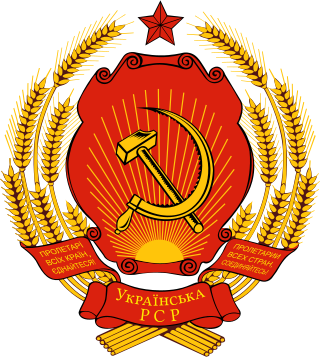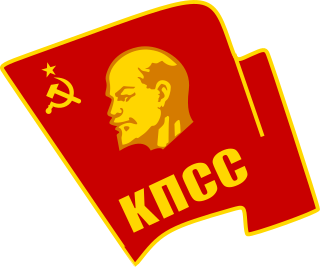| |||||
| Decades: | |||||
|---|---|---|---|---|---|
| See also: | |||||
Individuals and events related to 1921 in the Civil War-era Russia .
| |||||
| Decades: | |||||
|---|---|---|---|---|---|
| See also: | |||||
Individuals and events related to 1921 in the Civil War-era Russia .

Nikolai Ivanovich Bukharin was a Russian revolutionary, Soviet politician, and Marxist theorist. A prolific author on economic theory, Bukharin was a prominent Bolshevik and was active in the leadership of the Communist Party of the Soviet Union from 1917 until his purge in the 1930s.

Nikolay Nikolayevich Krestinsky was a Soviet Bolshevik revolutionary and politician who served as the Responsible Secretary of the Communist Party of the Soviet Union.

An index of articles related to the former nation known as the Soviet Union. It covers the Soviet revolutionary period until the dissolution of the Soviet Union. This list includes topics, events, persons and other items of national significance within the Soviet Union. It does not include places within the Soviet Union, unless the place is associated with an event of national significance. This index also does not contain items related to Soviet Military History.
The Ryutin affair (1932) was one of the last attempts to oppose the General Secretary Joseph Stalin within the All-Union Communist Party (b).
The Group of Democratic Centralism, sometimes called the Group of 15, the Decists, or the Decemists, was a dissenting faction within the Communist Party of the Soviet Union in the early 1920s.
The 7th (extraordinary) Congress of the RSDLP(b) (Russian Social Democratic Labor Party), also known as the Extraordinary 7th Congress of the RCP(b) (Russian Communist Party (Bolsheviks)), was held between 6–8 March 1918. During this congress the Bolsheviks changed the name of the party to include the word "Communist".
The 12th Congress of the Russian Communist Party (Bolsheviks) was held during 17–25 April 1923 in Moscow. The congress elected the 12th Central Committee. It was attended by 408 delegates with deciding votes and 417 with consultative votes, representing 386,000 party members. This was the last congress of the Russian Communist Party (Bolsheviks) (RCP(b) during Vladimir Lenin's leadership, though Lenin was unable to attend due to illness.

The Communist Party of Ukraine was the founding and ruling political party of the Ukrainian SSR operated as a republican branch of the Communist Party of the Soviet Union (CPSU).
The 8th Congress of the Russian Communist Party (b) was held in Moscow 18–-23 March 1919. The Congress was attended by 301 voting delegates who represented 313,766 Party members. A further 102 delegates attended with speaking rights, but no vote. It elected the 8th Central Committee.

The Council of People's Commissars of the Russian Soviet Federative Socialist Republic was the government of Soviet Russia between 1917 and 1946. It was established by the Second All-Russian Congress of Soviets of Workers', Soldiers', and Peasants' Deputies on November 9, 1917 "as an interim workers' and peasants' government" under the name of the Council of People's Commissars, which was used before the adoption of the Constitution of the Russian Socialist Federative Soviet Republic of 1918.

Alexei Ivanovich Rykov was a Russian Bolshevik revolutionary and a Soviet politician and statesman, most prominent as premier of Russia and the Soviet Union from 1924 to 1929 and 1924 to 1930 respectively. He was one of the accused in Joseph Stalin's show trials during the Great Purge.

The Political Bureau of the Central Committee of the Communist Party of the Soviet Union, or Politburo was the highest policy-making authority within the Communist Party of the Soviet Union and defacto a collective presidency of the USSR. It was founded in October 1917, and refounded in March 1919, at the 8th Congress of the Bolshevik Party. It was known as the Presidium from 1952 to 1966. The existence of the Politburo ended in 1991 upon the breakup of the Soviet Union.
The Nineteenth Congress of the Communist Party of the Soviet Union was held from 5 to 14 October 1952. It was the first party congress since before World War II and the last under Joseph Stalin's leadership. It was attended by many dignitaries from foreign Communist parties, including Liu Shaoqi from China. At this Congress, Stalin gave the last public speech of his life. The 19th Central Committee was elected at the congress.

The Kommunarka firing range, former dacha of secret police chief Genrikh Yagoda, was used as a burial ground from 1937 to 1941. Executions may have been carried out there by the NKVD during the Great Terror and until the war started; alternatively, bodies of those shot elsewhere might have been brought there for later interment. As Russian historian Arseny Roginsky explained: "firing range" was a popular euphemism adopted to describe mysterious and closely-guarded plots of land that the NKVD began to set aside for mass burials on the eve of the Great Terror.
The following lists events that happened during 1990 in the Union of Soviet Socialist Republics.
The leaders of the Russian Civil War listed below include the important political and military figures of the Russian Civil War. The conflict, fought largely from 7 November 1917 to 25 October 1922, was fought between numerous factions, the two largest being the Bolsheviks and the White Movement. While the Bolsheviks were centralized under the administration of the Russian Soviet Federative Socialist Republic and the Russian Communist Party (Bolsheviks), led by Vladimir Lenin, along with their various satellite and buffer states, the White Movement was more decentralized, functioning as a loose confederation of anti-Bolshevik forces united only in opposition to their common enemy - though from September 1918 to April 1920, the White Armies were nominally united under the administration of the Russian State, when, for nearly two years, Admiral Alexander Kolchak served as the overall head of the White Movement and as the internationally recognized Head of State of Russia. In addition to the two primary factions, the war also involved a number of third parties, including the anarchists of the Revolutionary Insurgent Army of Ukraine, and the non-ideological Green Armies.
The Sixth of July is a 1968 Soviet drama film directed by Yuli Karasik. The film is based on real historical events and is dedicated to the 50th anniversary of the Bolsheviks suppression of the Left SR Uprising, during the Russian Civil War.

An index of articles related to the Russian Revolution and the Russian Civil War period (1905–1922). It covers articles on topics, events, and persons related to the revolutionary era, from the 1905 Russian Revolution until the end of the Russian Civil War. The See also section includes other lists related to Revolutionary Russia and the Soviet Union, including an index of articles about the Soviet Union (1922–1991) which is the next article in this series, and Bibliography of the Russian Revolution and Civil War.

Sergei Vitalevich Mrachkovsky was a Russian revolutionary, Red Army commander, and supporter of Leon Trotsky, who was executed at the start of the Great Purge.